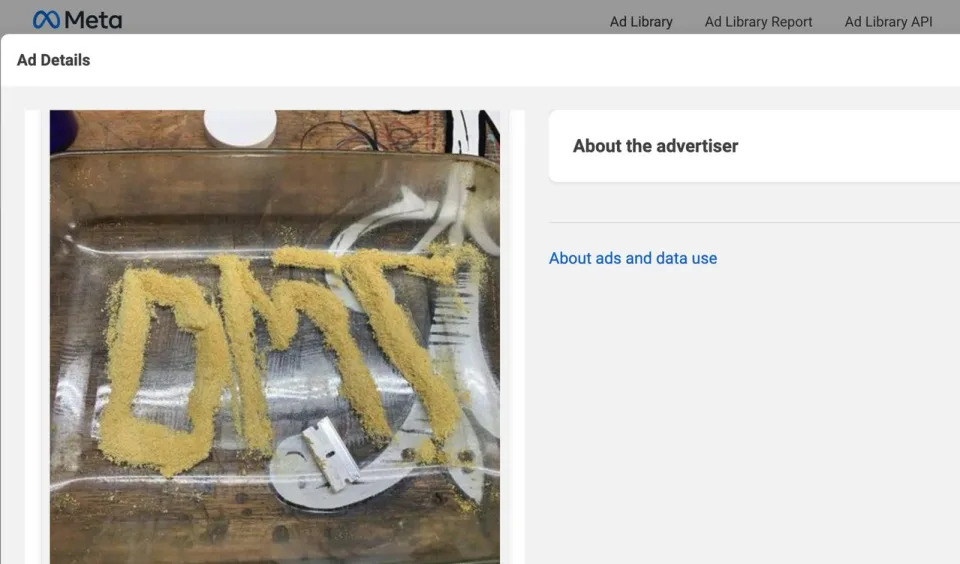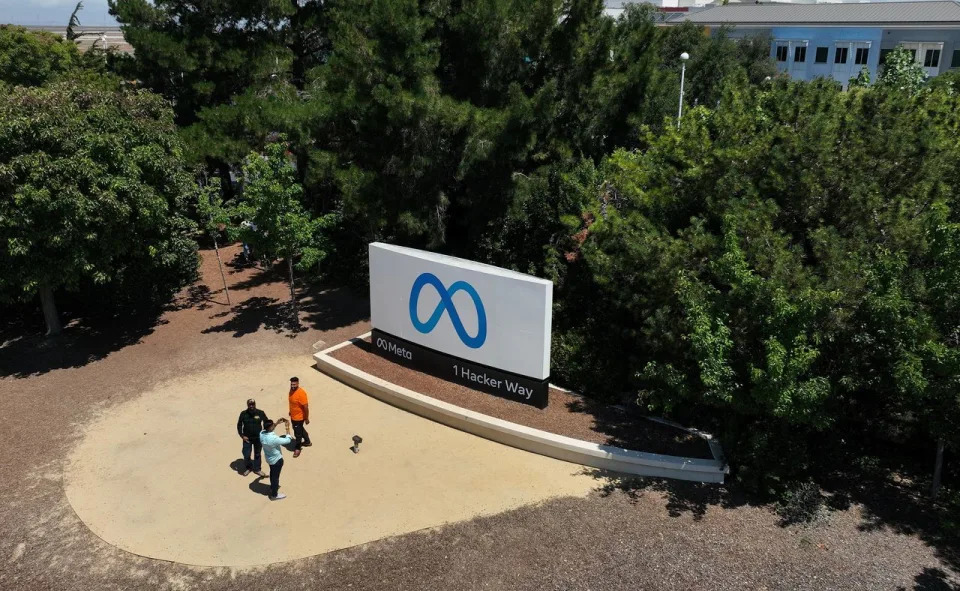Noor Al-Sibai
FUTURISM
Wed, July 31, 2024

Despite a federal investigation into the practice, Meta continues to run ads on Facebook and Instagram selling cocaine and other illicit drugs — some of which have been found to contain fentanyl, a deadly opioid linked to hundreds of thousands of overdose deaths in recent years.
As the Wall Street Journal reports, the company's ad marketplace was until recently still making money from ads for illicit drugs months after it was revealed that federal prosecutors in Virginia are investigating the troubling trend.
Despite running counter to its own policies banning such ads, tech-savvy dealers manage to skirt Meta's rules by posting photos of their wares instead of writing out what they're selling in the product description, which would trigger the AI censors deployed on the social networks. In one such ad found by the WSJ, the letters "DMT" are spelled out in what is presumably a powdered version of the powerful hallucinogen, which is short for the chemical name N,N-Dimethyltryptamine.
After clicking on the ads, users are generally taken to a third-party site or social network. Often, they're entered into dealer chat feeds on the messaging app Telegram, a less-regulated WhatsApp clone that Meta does not own. After products are delivered, users will respond "TD" or "touchdown," the WSJ notes.
As recently as last week, the WSJ said that it had seen ads selling cocaine and prescription opioids on the Ad Library, though after alerting Meta to their existence, all were taken down — the typical tech giant modus operandi once violating ads are brought to light by media.
Though the WSJ didn't say exactly how many "dozens" of ads it found for the month of July, it did note that the Tech Transparency Project watchdog group found that between March and June, there were more than 450 of these ads running on Meta's Ad Library.
"Our systems are designed to proactively detect and enforce against violating content, and we reject hundreds of thousands of ads for violating our drug policies," a Meta spokesperson told the WSJ. "We continue to invest resources and further improve our enforcement on this kind of content."
The fact that these ads manage to run and make Meta money is bad enough, but as the WSJ notes, these digital drug deals seem to have a death toll associated with them as well.
Last fall, for instance, 15-year-old California boy Elijah Ott died of an overdose after exchanging Instagram messages with someone who was selling marijuana oil and a Xanax-esque drug. His autopsy found that he had a fatal amount of fentanyl in his system, and his mother, Mikayla Brown, believes the drugs he'd bought off of IG had been laced with it.
Even more horrifically, the WSJ found that the accounts the teen had been in contact with remained live for months after his death — though of course, Meta took them down once the newspaper brought them to the company's attention.
Like some of the parents who confronted Zuckerberg on the Senate floor at the beginning of this year about some of the other harms his social networks hath wrought, Brown very much blames Instagram for her son dying so young.
"Because of this app," the grieving mother told the WSJ, "my child does not get to live."
More on Meta mistakes: Meta's AI Says Trump Wasn't Shot

Meta Has Run Hundreds of Ads for Cocaine, Opioids and Other Drugs
Wed, July 31, 2024

Despite a federal investigation into the practice, Meta continues to run ads on Facebook and Instagram selling cocaine and other illicit drugs — some of which have been found to contain fentanyl, a deadly opioid linked to hundreds of thousands of overdose deaths in recent years.
As the Wall Street Journal reports, the company's ad marketplace was until recently still making money from ads for illicit drugs months after it was revealed that federal prosecutors in Virginia are investigating the troubling trend.
Despite running counter to its own policies banning such ads, tech-savvy dealers manage to skirt Meta's rules by posting photos of their wares instead of writing out what they're selling in the product description, which would trigger the AI censors deployed on the social networks. In one such ad found by the WSJ, the letters "DMT" are spelled out in what is presumably a powdered version of the powerful hallucinogen, which is short for the chemical name N,N-Dimethyltryptamine.
After clicking on the ads, users are generally taken to a third-party site or social network. Often, they're entered into dealer chat feeds on the messaging app Telegram, a less-regulated WhatsApp clone that Meta does not own. After products are delivered, users will respond "TD" or "touchdown," the WSJ notes.
As recently as last week, the WSJ said that it had seen ads selling cocaine and prescription opioids on the Ad Library, though after alerting Meta to their existence, all were taken down — the typical tech giant modus operandi once violating ads are brought to light by media.
Though the WSJ didn't say exactly how many "dozens" of ads it found for the month of July, it did note that the Tech Transparency Project watchdog group found that between March and June, there were more than 450 of these ads running on Meta's Ad Library.
"Our systems are designed to proactively detect and enforce against violating content, and we reject hundreds of thousands of ads for violating our drug policies," a Meta spokesperson told the WSJ. "We continue to invest resources and further improve our enforcement on this kind of content."
The fact that these ads manage to run and make Meta money is bad enough, but as the WSJ notes, these digital drug deals seem to have a death toll associated with them as well.
Last fall, for instance, 15-year-old California boy Elijah Ott died of an overdose after exchanging Instagram messages with someone who was selling marijuana oil and a Xanax-esque drug. His autopsy found that he had a fatal amount of fentanyl in his system, and his mother, Mikayla Brown, believes the drugs he'd bought off of IG had been laced with it.
Even more horrifically, the WSJ found that the accounts the teen had been in contact with remained live for months after his death — though of course, Meta took them down once the newspaper brought them to the company's attention.
Like some of the parents who confronted Zuckerberg on the Senate floor at the beginning of this year about some of the other harms his social networks hath wrought, Brown very much blames Instagram for her son dying so young.
"Because of this app," the grieving mother told the WSJ, "my child does not get to live."
More on Meta mistakes: Meta's AI Says Trump Wasn't Shot
Meta Has Run Hundreds of Ads for Cocaine, Opioids and Other Drugs
Salvador Rodriguez
Wed, July 31, 2024
Meta Platforms is running ads on Facebook and Instagram that steer users to online marketplaces for illegal drugs, months after The Wall Street Journal first reported that the social-media giant was facing a federal investigation over the practice.
The company has continued to collect revenue from ads that violate its policies, which ban promoting the sale of illicit or recreational drugs. A review by the Journal in July found dozens of ads marketing illegal substances such as cocaine and prescription opioids, including as recently as Friday. A separate analysis over recent months by an industry watchdog group found hundreds of such ads.

An ad from Meta’s ad library featuring powder spelling out ‘DMT,’ a psychedelic drug. -
The ads show photos of prescription-drug bottles, piles of pills or bricks of cocaine. “Place your orders,” said one of the ads the Journal found in July. It also included a photo of a razorblade and a yellow powder arranged to spell out “DMT,” a psychedelic drug.
The Journal reported in March that federal authorities were investigating Meta for its role in the illicit sale of drugs. The nonprofit Tech Transparency Project, which investigates online platforms, reviewed Meta’s ad library from March to June and found more than 450 illicit drug ads on Facebook and Instagram.
“You don’t need the dark web anymore when you can just buy a Facebook ad to sell dangerous drugs or even scam people at a scale that wouldn’t have been possible through the dark web,” said Katie Paul, director of the Tech Transparency Project.
Meta uses artificial-intelligence tools to moderate content, but the company’s tools haven’t managed to stop such drug ads, which often redirect users to other platforms where they can make purchases. The use of photos to showcase the drugs available appears to make it possible for the ads to bypass Meta’s content-moderation systems.

Meta disabled many of the drug ads spotted by The Wall Street Journal within 48 hours of when they went live, a company spokesman said. - Justin Sullivan/Getty Images
Meta works with law enforcement to combat this type of activity, a spokesman for the company said. The company’s content-moderation teams were affected by staff cuts in recent years. The spokesman said the company has quadrupled the size of the team working on safety and security since 2016.
“Our systems are designed to proactively detect and enforce against violating content, and we reject hundreds of thousands of ads for violating our drug policies,” the spokesman said. “We continue to invest resources and further improve our enforcement on this kind of content. Our hearts go out to those suffering from the tragic consequences of this epidemic—it requires all of us to work together to stop it.”
When users click on the Facebook pages or Instagram accounts associated with the ads, those pages often include additional, nonsponsored photos or posts of drug-related content. Some of the accounts use names that make it clear they are for the transaction of drugs, such as the ad for DMT, which was posted by an account called “DMT Vapes and Notes.”
Users who click the links in the ads are typically taken to private group chats on the app Telegram, which isn’t a Meta property. When accessed, these group chats typically show a stream of posts from the dealers that include photos of the drugs they offer, menus with prices and instructions for placing orders, according to the Journal’s review and the Tech Transparency Project analysis.
Telegram representatives didn’t respond to messages seeking comment about the practice.
Some of the private chats will include posts that say “TD” or “Touchdown” to indicate a successful shipment to a customer delivered via a shipping service. In some cases, the ads link to private group chats on Meta’s WhatsApp encrypted messaging service, according to the Tech Transparency Project report.
Meta disabled many of the drug ads spotted by the Journal within 48 hours of when they went live, the company spokesman said.
All of the ads have now been removed for violating Meta’s policies, and after being contacted, the company has also banned the users who created the ads from its platform. Additionally, the company said it is using insights about new adversarial tactics garnered from investigating these ads to fan out and do additional sweeps.
Section 230
Lawmakers have been discussing the need to hold technology companies responsible for what third parties post on their platforms. Efforts to do so have been complicated by Section 230 of the Communications Decency Act, which says online platforms aren’t liable for what third parties post, with a few exceptions. The Supreme Court left core elements of Section 230 unchanged after deciding on two cases involving the law in 2023.
The Justice Department in the past has tried to extend the reach of federal drug laws in a way that holds internet platforms culpable when companies use it to break the law. In 2011, Google agreed to pay $500 million for allowing online Canadian pharmacies to place ads targeting U.S. consumers, resulting in the unlawful importation of prescription drugs in the U.S.

Mikayla Brown and her family walking through a cemetery in Paso Robles, Calif., on their way to visit Elijah Ott’s grave. - Zaydee Sanchez for WSJ
At a Senate hearing in January, a number of parents said they think Meta and other social-media companies are responsible for the deaths of their children, including because of illegal drug sales on social platforms that led to overdoses from fentanyl, a synthetic opioid.
Chief Executive Mark Zuckerberg apologized at the hearing.
“I’m sorry for everything you have all been through,” Zuckerberg said. “No one should go through the things that your families have suffered, and this is why we invest so much…to make sure no one has to go through the things your families have had to suffer.”
Elijah’s death
Mikayla Brown, 34 years old, is among the parents who think Meta is responsible for the drug-overdose death of her child.
Her son Elijah Ott, a 15-year-old sophomore in California who loved to skateboard and cook Cajun pasta with his mother, died last September. After his death, Brown said she found messages on his phone showing how he connected with an Instagram account selling illegal drugs and sought to purchase marijuana oil and a pharmaceutical similar to Xanax.
In his autopsy, Ott tested positive for the Xanax-like pharmaceutical and a larger amount of fentanyl, which was determined to be the cause of his death. Brown said she thinks the drug purchased by her son was laced with fentanyl.
A review by the Journal showed those accounts remained live on Instagram months later. Meta disabled the accounts associated with the dealer after being contacted by the Journal.
“Because of this app, my child does not get to live,” Brown said.
Biden calls for bigger penalties, more controls to fight US fentanyl crisis
Updated Wed, July 31, 2024

FILE PHOTO: Fentanyl precursors at Reuters' office in New York City
By Trevor Hunnicutt
WASHINGTON (Reuters) -President Joe Biden called for larger penalties for drug smugglers and stricter controls on pill presses and importers on Wednesday as part of new steps to deal with the U.S. opioid crisis, according to a senior administration official.
The efforts come as illicit fentanyl remains a potent issue for Biden and Vice President Kamala Harris, who is poised to clinch the Democratic nomination for the Nov. 5 election. Fentanyl overdoses have surged to become the leading cause of death for Americans between the ages of 18 and 45 and over 107,000 Americans died from drug overdoses in 2023.
The lethal narcotic is trafficked into the United States, often across the porous U.S.-Mexico border, and easily manufactured from chemicals sourced in China.
Biden said he was directing federal agencies to do more on collecting intelligence, coordination to disrupt trafficking and working with the private sector on counter-narcotics, according to the official, who declined to be named.
He will also ask Congress to pass legislation to create a nationwide registry of pill press machinery that could be used to produce the drugs, raise penalties on traffickers, regulate some fentanyl-related substances more stringently and require importers of small packages to provide more information to customs officials.
"This is a time to act. And this is a time to stand together - for all those we have lost, and for all the lives we can still save," Biden said in a statement.
As part of an effort launched last year to thaw icy relations with Chinese President Xi Jinping, Biden agreed to cooperate with Beijing on counter-narcotics.
A delegation of senior Chinese officials was set to meet the Biden administration on Wednesday to continue conversations on increasing controls on fentanyl chemicals and restricting financing for the drug trade in China.
"We are well aware that there is a lot more that the PRC needs to do," said the official, referring to the People's Republic of China.
Biden and Harris have faced criticism from Republican presidential candidate Donald Trump over irregular crossings along the Mexican border. Biden administration officials have pushed back on the criticism, blaming Republicans for killing a bipartisan deal that would have increased border patrol resources to crack down on drug trafficking.
(Reporting by Trevor Hunnicutt; Additional reporting by Doina Chiacu. Editing by Heather Timmons and Deepa Babington)
No comments:
Post a Comment